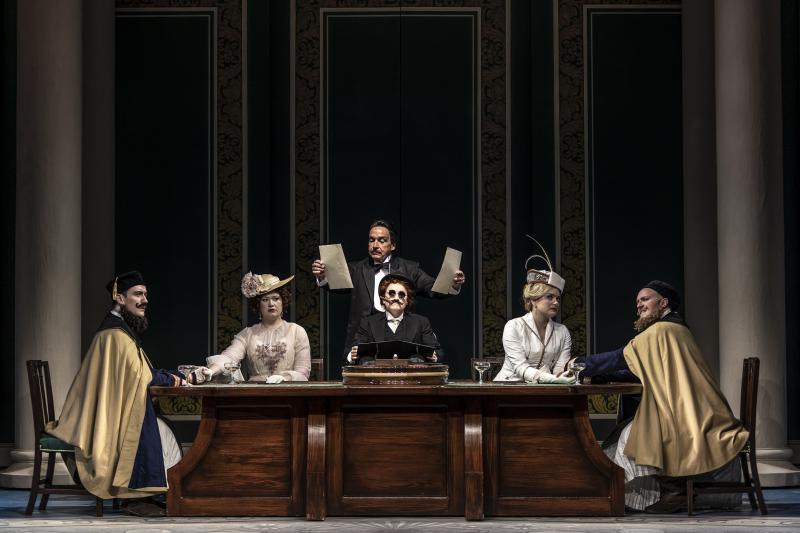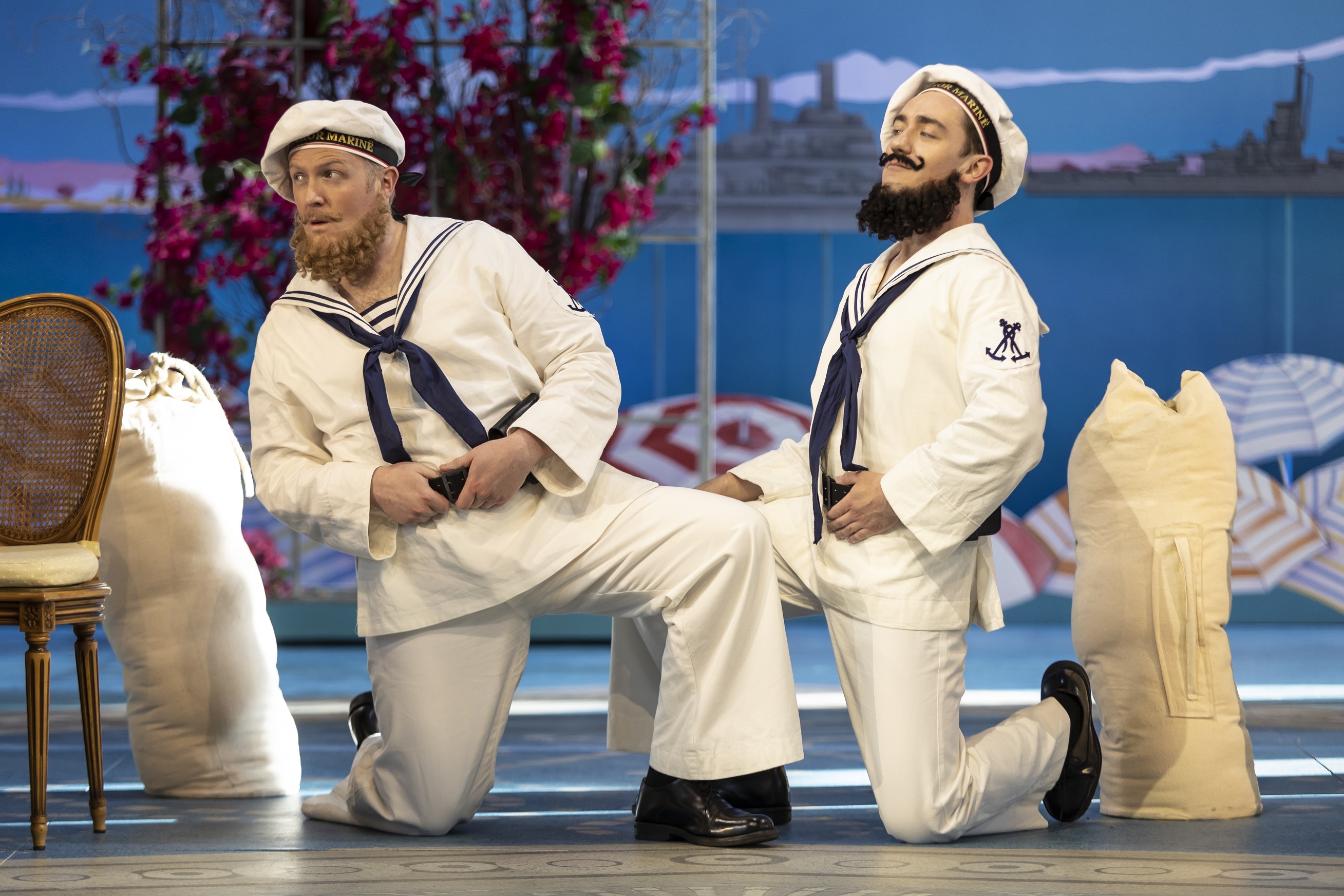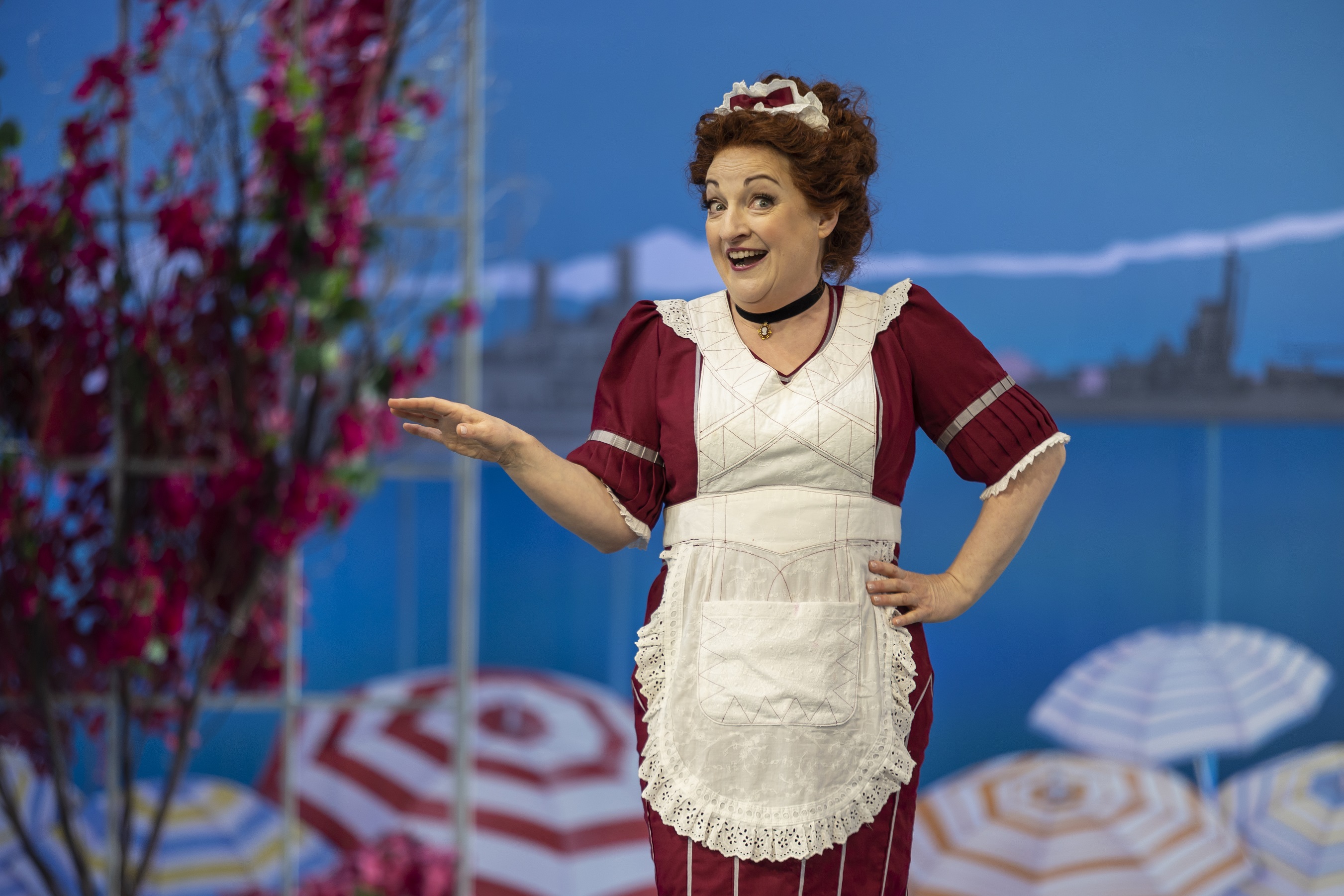Così fan tutte, Garsington Opera review - gambling with the highest stakes | reviews, news & interviews
Così fan tutte, Garsington Opera review - gambling with the highest stakes
Così fan tutte, Garsington Opera review - gambling with the highest stakes
Serious fun in a shrewd staging of this 'School for Lovers'

The scene is Monte-Carlo, around the beginning of the last century: a carefully observed world of cloudless skies, glittering seas, high society and careless privilege shared with Death in Venice.
The first night on Thursday was slow to ignite, a touch clunky in transition from casino table to hotel suite, conducted by Tobias Ringborg as if dotting every i in a recording studio. It snapped together with a beautifully centred “Smanie implacabili” from Polly Leech’s Dorabella, pitched acutely between a caricature of desperation and genuine anxiety. Leech’s cry of “Fuggi, fuggi, fuggi” – in response to nothing more than a cup of hot chocolate – captures the spirit of the piece in a nutshell, as a knife-edge parody of and homage to operatic conventions (and her biscuit eating deserves an Oscar nomination). Likewise, Camilla Harris sings Fiordiligi’s “Come scoglio” with a secure command of its perilous leaps of register, and crucially without putting on airs of eternal chastity.  The two officers – and Albanians (pictured above) – are just as finely distinguished from each other as the sisters. As a silkily Italianate Guilermo, Seán Boylan is no more wholly the brittle Casanova than Gavan Ring is the vulnerable poet, though Ferrando’s “Un’aura amorosa” lets the tension sag before the first-act finale, a serenade sung as a soliloquy. All four lovers give youthful and impetuous but fully rounded accounts of their roles.
The two officers – and Albanians (pictured above) – are just as finely distinguished from each other as the sisters. As a silkily Italianate Guilermo, Seán Boylan is no more wholly the brittle Casanova than Gavan Ring is the vulnerable poet, though Ferrando’s “Un’aura amorosa” lets the tension sag before the first-act finale, a serenade sung as a soliloquy. All four lovers give youthful and impetuous but fully rounded accounts of their roles.
It is at this point that “Bella vita militar” – crisply dispatched by a well-drilled Garsington Chorus – takes on graver significance than a put-up job. The sisters’ (temporary) reappearance as military nurses stamps a specific time and context on Don Alfonso’s wager. It also charges the drama with vital and provisional tension: perhaps Don Alfonso is no more master of the situation than anyone else. Henry Waddington leaves world-weary cynicism to our imaginations and sings him as a polished chancer largely operating on the fly.  The first-act finale itself comes together as a superbly musical piece of work, stage and score moving in rapid and ingenious sync. A measure of agency – again temporary – passes to the girls in the second act while the subtleties of staging and characterisation multiply, so much so that the big reveal – and Così has to end somehow – comes as a slight let-down by throwing the fate of the lovers to chance. Sung by Ailish Tynan (pictured above) with knockout timing and brightly focused tone, Despina is left as hurt and confused as the sisters.
The first-act finale itself comes together as a superbly musical piece of work, stage and score moving in rapid and ingenious sync. A measure of agency – again temporary – passes to the girls in the second act while the subtleties of staging and characterisation multiply, so much so that the big reveal – and Così has to end somehow – comes as a slight let-down by throwing the fate of the lovers to chance. Sung by Ailish Tynan (pictured above) with knockout timing and brightly focused tone, Despina is left as hurt and confused as the sisters.
Full of human warmth as well as uncomfortable truths, like the pages of La Rochefoucauld come to life, it’s nevertheless a Così of considerably greater charm and more lasting satisfactions than either of the current ENO and Royal Opera stagings, operating at the highest musical levels. Ringborg supplies an unfussy fortepiano continuo and secures crisp, colourful playing from The English Concert: the horns deserve special mention for their spicy obbligato support of Fiordiligi’s “Per pietà”. Those of us already inclined to think of Così fan tutte as something like the perfect opera will find every confirmation here.
rating
Explore topics
Share this article
The future of Arts Journalism
You can stop theartsdesk.com closing!
We urgently need financing to survive. Our fundraising drive has thus far raised £49,000 but we need to reach £100,000 or we will be forced to close. Please contribute here: https://gofund.me/c3f6033d
And if you can forward this information to anyone who might assist, we’d be grateful.

Subscribe to theartsdesk.com
Thank you for continuing to read our work on theartsdesk.com. For unlimited access to every article in its entirety, including our archive of more than 15,000 pieces, we're asking for £5 per month or £40 per year. We feel it's a very good deal, and hope you do too.
To take a subscription now simply click here.
And if you're looking for that extra gift for a friend or family member, why not treat them to a theartsdesk.com gift subscription?
more Opera
 Madama Butterfly, Irish National Opera review - visual and vocal wings, earthbound soul
Celine Byrne sings gorgeously but doesn’t round out a great operatic character study
Madama Butterfly, Irish National Opera review - visual and vocal wings, earthbound soul
Celine Byrne sings gorgeously but doesn’t round out a great operatic character study
 theartsdesk at Wexford Festival Opera 2025 - two strong productions, mostly fine casting, and a star is born
Four operas and an outstanding lunchtime recital in two days
theartsdesk at Wexford Festival Opera 2025 - two strong productions, mostly fine casting, and a star is born
Four operas and an outstanding lunchtime recital in two days
 The Railway Children, Glyndebourne review - right train, wrong station
Talent-loaded Mark-Anthony Turnage opera excursion heads down a mistaken track
The Railway Children, Glyndebourne review - right train, wrong station
Talent-loaded Mark-Anthony Turnage opera excursion heads down a mistaken track
 La bohème, Opera North review - still young at 32
Love and separation, ecstasy and heartbreak, in masterfully updated Puccini
La bohème, Opera North review - still young at 32
Love and separation, ecstasy and heartbreak, in masterfully updated Puccini
 Albert Herring, English National Opera review - a great comedy with depths fully realised
Britten’s delight was never made for the Coliseum, but it works on its first outing there
Albert Herring, English National Opera review - a great comedy with depths fully realised
Britten’s delight was never made for the Coliseum, but it works on its first outing there
 Carmen, English National Opera review - not quite dangerous
Hopes for Niamh O’Sullivan only partly fulfilled, though much good singing throughout
Carmen, English National Opera review - not quite dangerous
Hopes for Niamh O’Sullivan only partly fulfilled, though much good singing throughout
 Giustino, Linbury Theatre review - a stylish account of a slight opera
Gods, mortals and monsters do battle in Handel's charming drama
Giustino, Linbury Theatre review - a stylish account of a slight opera
Gods, mortals and monsters do battle in Handel's charming drama
 Susanna, Opera North review - hybrid staging of a Handel oratorio
Dance and signing complement outstanding singing in a story of virtue rewarded
Susanna, Opera North review - hybrid staging of a Handel oratorio
Dance and signing complement outstanding singing in a story of virtue rewarded
 Ariodante, Opéra Garnier, Paris review - a blast of Baroque beauty
A near-perfect night at the opera
Ariodante, Opéra Garnier, Paris review - a blast of Baroque beauty
A near-perfect night at the opera
 Cinderella/La Cenerentola, English National Opera review - the truth behind the tinsel
Appealing performances cut through hyperactive stagecraft
Cinderella/La Cenerentola, English National Opera review - the truth behind the tinsel
Appealing performances cut through hyperactive stagecraft
 Tosca, Royal Opera review - Ailyn Pérez steps in as the most vivid of divas
Jakub Hrůša’s multicoloured Puccini last night found a soprano to match
Tosca, Royal Opera review - Ailyn Pérez steps in as the most vivid of divas
Jakub Hrůša’s multicoloured Puccini last night found a soprano to match
 Tosca, Welsh National Opera review - a great company reduced to brilliance
The old warhorse made special by the basics
Tosca, Welsh National Opera review - a great company reduced to brilliance
The old warhorse made special by the basics

Add comment